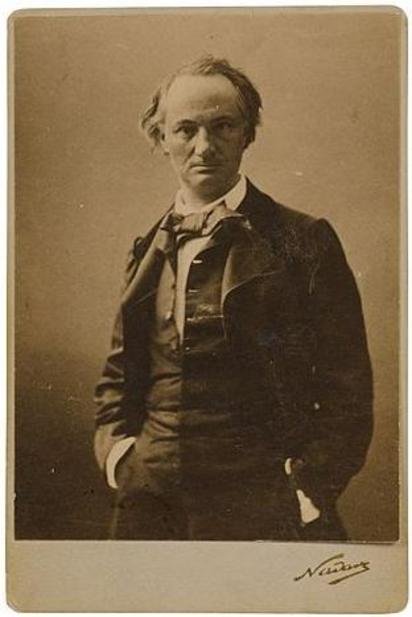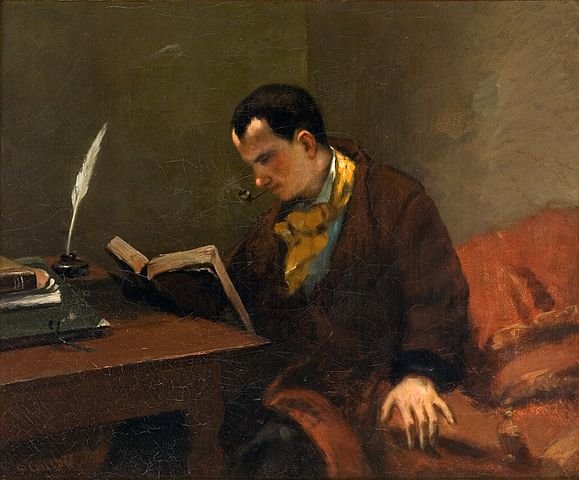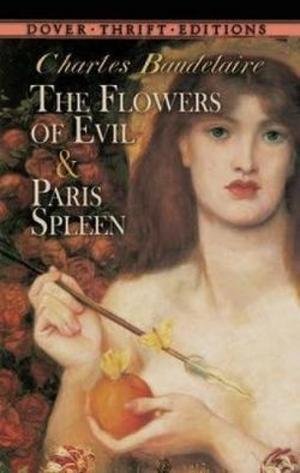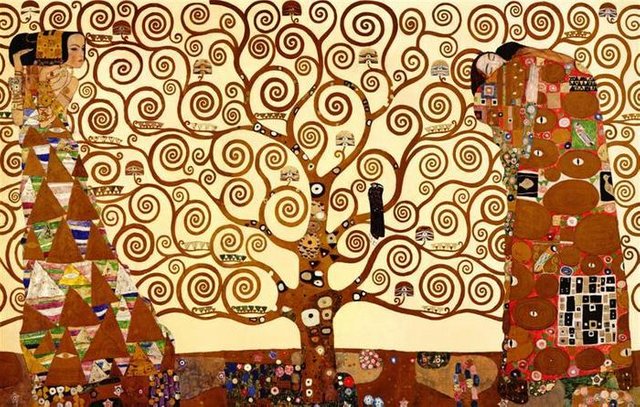ADSactly Literature: Charles Baudelaire: foundational writer of modern lyrics (Part II)

Charles Baudelaire: foundational writer of modern lyrics (Part II)
In the previous post we left our presentation of Baudelaire in the note about his general conception of poetry. We take it up again to continue.
*For Baudelaire poetry is communicated through the image, a highly relevant idea. Therefore, the poetic word is subjective and open and, as such, raises the plurality of meanings (polysemy). This is the basis of Baudelaire's fundamental contribution to Symbolism and, perhaps, to poetry in general: the language of poetry should suggest, not denominate or denote; its character is indirect, both in emotion and in idea. This conception is condensed in the resource of the symbol, and in the assumption of music, not so much in its sensual use, but, according to Balakian, "considered as a form (...) that activates the mind more to suggest than to dictate concepts and visions".
"The poem becomes an enigma," Baudelaire says at some point. The condition of significant multiplicity that the poetic word acquires shapes this mystery. There is never the definitive and exclusive understanding of the poem, but the meaning remains in ambiguity, as in the visions of dreams.

*We thus move on to Baudelaire's conception of the poetic process. His understanding of this process, one of the most accurate within the known, can be summarized as follows: the stimulus affects the sensory senses; the senses influence the mind; by the action of the mind the words are produced but in a state of wakefulness that can be considered as "over rational". Thus, the poem would emerge as a verbal act that the poet has not been formed in an absolutely conscious way, since aspects of a dimension of the psyche not completely controlled come into play.
*Which leads to the poet concept in our writer. Since Homer the poet had been considered a bard, that is, a rapsoda, capable of singing and telling -in the epic sense- mythical and historical events and ennobling the human condition. With Baudelaire there is a fundamental change in the concept and function of the poet: firstly, the process of transmutation of reality implied by the poetic act will make the poet discover his "own divinity" (faculty of creation); secondly, poetic activity will be, more than emotional, an intellectual exercise. As Balakian adds, from this work of perception and interpretation, "the poet feels inclined to decipher, rather than to transmit or communicate, the enigma of life". Hence the image of the poet as a dream worker, visionary or seer (later taken up by Rimbaud).
In his poem "Parisian dream" we read the stanza:
Architect of my wonders,
I did, at my will,
under its tunnel of stones
to pass an ocean tamed
After the general considerations of Baudelaire's conception, let us now turn to specific characterizing aspects of his literary work (see also here). We will focus on four fundamentals.

*Analogy and irony
The analogy could be synthesized at the beginning: Everything corresponds, because everything is rhythm, hence it is also called universal correspondence. It is a matter of philosophical and religious (especially mystical) roots as old as human culture. In addition to being present in the great initial civilizations, it can be found in Platonism and Plotinism, it spreads in the medieval world, it is preserved in sects of the Renaissance and of the 17th and 18th centuries (Kabbalists, Gnostics, occultists, hermetics), until it resurrects in Romanticism. It will be central in the thinking of authors such as Swedenborg and Fourier, whose ideas will enhance the visions of romantic poets, until they reach Baudelaire.
Analogy is at the heart of Baudelaire's poetry. Octavio Paz, who studied it, points out that it is expressed in two ideas: one, to conceive the universe as a language in continuous movement. The universe is a set of signs that speak to us, but they do not form a single text and are in constant transformation. A quote from Baudelaire's essay on the composer Richard Wagner illustrates this:
It is not surprising that true music suggests analogous ideas in different brains; what would be surprising would be that sound does not suggest color, that colors cannot give the idea of a melody and that sounds and colors cannot translate ideas; things have always been expressed by a reciprocal analogy, since the day God professed the world as an indivisible and complex totality.

The second relevant idea deduced from Baudelaire's analogical vision is that, if the universe is an encrypted writing, the poet - as we have already indicated - is a decryptor, a translator. Peace expresses it with a particular verbal beauty:
Each poem is a reading of reality; that reading is a translation; that translation is a writing. (...) The poem is the double of the universe: a secret writing, a space covered with hieroglyphics. To write a poem is to decipher the universe only to encrypt it again.
The poem entitled precisely "Correspondences", from his book The Flowers of Evil, is emblematic of that conception, which we copy below:
Nature is a temple, where lively
Columns sometimes breathe confusing speech;
Man walks within these groves of symbols, each
Of which regards him as a kindred thing.
As the long echoes, shadowy, profound,
Heard from afar, blend in a unity,
Vast as the night, as sunlighťs c1arity,
So perfumes, colours, sounds may correspond.
Odours there are, fresh as a baby's skin,
Mellow as oboes, green as meadow grass,
Others corrupted, rich, triumphant, full,
Having dimensions infinitely vast,
As amber, incense, musk, and benzoin,
Singing the senses' rapture, and the soul's.
Baudelaire's well-known sonnet, although some interpretations have given it a metaphysical character, actually expresses an earthly vision of correspondence. It is not so much the relationship of the inner vision with the extraterrestrial divine, as the correlation between the inner and the outer reality, between the subjective and the objective.
Beyond the transcendent beauty of his first verses - "Nature is a temple (...)", "man walks it through forests of symbols"-, we must pay attention to the later verses where synaesthesia becomes effective, the encounter of sensory experiences (smells, tactile sensations, sounds, colours, etc.) with subjectivity. This fundamental synaesthetic association is expressed in the last verse: "having the expansion of infinite things, / (...) / which are sung by the transports of the spirit and the senses".

Now, the analogical vision in Baudelaire pairs contradictorily with irony, which expresses the rebellious and, at the same time, melancholic consciousness of the poet. The irony manifests the awareness of difference, of the strange, of the grotesque, of separation, of the human subject to the effects of the historical, and, likewise, awareness of sin and death. Irony will perhaps be the highest expression of critical passion, which for Octavio Paz is inherent to modernity, of which Baudelaire will be very aware.
An illustration of this irony can be found, for example, in the poem "A carrion" or "A Carcass" (also from The Flowers of Evil), which, being an extensive poem, we will only copy and comment on some of its stanzas.
Remember, my love, the object we saw
That beautiful morning in June:
By a bend in the path a carcass reclined
On a bed sown with pebbles and stones;
Her legs were spread out like a lecherous whore,
Sweating out poisonous fumes,
Who opened in slick invitational style
Her stinking and festering womb.
The sun on this rottenness focused its rays
To cook the cadaver till done,
And render to Nature a hundredfold gift
Of all she'd united in one.

And you, in your turn, will be rotten as this:
Horrible, filthy, undone,
O sun of my nature and star of my eyes,
My passion, my angel in one!
Yes, such will you be, o regent of grace,
After the rites have been read,
Under the weeds, under blossoming grass
As you moulder with bones of the dead.
Ah then, o my beauty, explain to the worms
Who cherish your body so tine,
That I am the keeper for corpses of love
Of the form, and the essence divine!
Apart from having as a motif an object that the preceptive would have as little poetic: a decomposing corpse of a dog, in the first three stanzas (the first of the poem) the ironic vision is evidenced by mixing the perception of corruption with a certain exaltation of this and the beauty of the morning and a sensuality close to eroticism. And in the other three stanzas (the last ones of the poem), the speaker, once again appealing to his beloved or to himself ("my soul"), will face him that this will be his destiny, the putrefaction that death supposes. However, this is a possible interpretation, since the ambiguity of the poetic word can give rise to others.
Bibliographic references
Balakian, Anna (1969) The Symbolist Movement, Spain: Eidt. Guadarrama.
Baudelaire, Charles (1973). The Flowers of Evil / Artificial Paradises / The Spleen of Paris. Spain: Edit. Bruguera.
Baudelaire, Charles (1979). Complete poetry (7th edition). Spain: Libros Río Nuevo.
Baudelaire, Charles (1999). Salons and other writings on art (2nd edition). Spain: Edit. Visor.
Compagnon, Antoine (1993). The Five Paradoxes of Modernity. Venezuela: Monte Ávila.
Friedrich, Hugo (1974). Structure of modern lyrics. Spain: Edit. Seix Barral.
Raymond, Marcel (1983). From Baudelaire to surrealism. Spain: Fondo de Cultura Económica.
Todó, Lluís (1987). Symbolism. Spain: Edit. Montesinos.
Paz, Octavio (1985). The sons of the limo. Colombia: Edit. The Black Sheep.
Other aspects remain to be dealt with, which I will deal with in a third and final part. Thank you for your attention.
Written by @josemalavem
Click on the coin to join our Discord Chat

Witness proposal is here:
Go To Steem Witness Page
In the bottom of the page type: adsactly-witness and press vote.

Use small letters and no "@" sign. Or, click here to vote directly!
Thank you!
Correspondence is one of Baudelaire's favorite poems. This poem is the author's own poetry, the poet's conception of poetry. From the title, we see that there is a kind of comparison, similarities that underlie the things that are in the environment of man. In his verses we see that the poet finds correspondences between the different aspects that make up nature. There are correspondences between the material world and the spiritual world. The first stanza says it: the world is a temple of symbols that we must decipher. Not only man deciphers, the poet must also decipher. It is his job: to discover those symbols, capturing, translating. It is the only way for the brilliant, exact, perfect poem to exist. Excellent work, @josemalavem. As always.
Once again it is a joy to be able to enjoy his impeccable work, @josemalavem and his masterful explanation of Baudelaire's reflections on poetic creation and the poet. Interesting what refers to the characteristic aspects of the literary work of this great poet. As for the irony present in the poem "A carrion", we see that even the grotesque and unbeautiful can be made poetry. The verses of the first stanzas quoted stimulate our senses and make us perceive the inhospitable atmosphere of the moment.
Thank you, @josemalavem for such an interesting publication and @adsactly for spreading it.
I am very pleased to be able to count on your reading, @aurodivys. Indeed, the grotesque is manifested in a special way in the poem "Una carroña" (A Carrion), with an unobviable sensual nuance. It is also a poem known as "poetic art" (I couldn't get into that so as not to abuse the reader), that is to say, Baudelaire also presents us with his conception of the creative process (of course, we would have to read the whole poem). Greetings.
Buenos días amigo @adsactamente deseo que se encuentre bien al igual que su familia , exelente trabajo sobre Charles Baudelaire escritor fundacional de letras modernas y maestro de maestros de la poesía. Que tenga una exelente día se le saluda desde Venezuela.
Thank you for your reading and assessment, @edgargonzalez.
Excelente trabajo, describiendo la poesía en sus diferentes tópicos de la vida, información interesante
de Charles Baudelaire explicando como es la poesía para el. Gracias
Thank you for your reading and assessment, @oresteg.